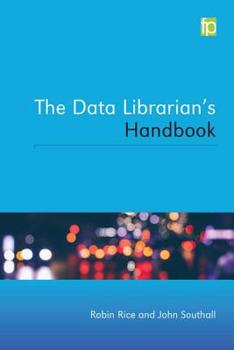The Data Librarian's Handbook
The importance of data has never been greater. There has been a growing concern with the skills required to exploit the data surfeit; the ability to collect, compute and crunch data, for economic, social and scientific purposes. This book, written by two working data librarians based at the Universities of Oxford and Edinburgh aims to help fill this skills gap by providing a nuts and bolts guide to research data support.
'The Data Librarian's Handbook' draws on a combination of over 30 years experience providing data support services to create the must-read book for all entrants to this field. This book zooms in to the actual library service level, where the interaction between the researcher and the librarian takes place. Both engaging and practical, this book draws the reader in through story-telling and suggested activities, linking concepts from one chapter to another.
This book is for the practising data librarian, possibly new in their post with little experience of providing data support. It is also for managers and policy-makers, public service librarians, research data management coordinators and data support staff. It will also appeal to students and lecturers in iSchools and other library and information degree programmes where academic research support is taught. The importance of data has never been greater. There has been a growing concern with the 'skills gap' required to exploit the data surfeit; the ability to collect, compute and crunch data, for economic, social and scientific purposes. This book, written by two working data librarians based at the Universities of Oxford and Edinburgh aims to help fill this skills gap by providing a nuts and bolts guide to research data support. The Data Librarian's Handbook draws on a combination of over 30 years' experience providing data support services to create the 'must-read' book for all entrants to this field. This book 'zooms in' to the actual library service level, where the interaction between the researcher and the librarian takes place. Both engaging and practical, this book draws the reader in through story-telling and suggested activities, linking concepts from one chapter to another. This book is for the practising data librarian, possibly new in their post with little experience of providing data support. It is also for managers and policy-makers, public service librarians, research data management "coordinators" and data support staff. It will also appeal to students and lecturers in iSchools and other library and information degree programmes where academic research support is taught.Related Subjects
Language Arts




